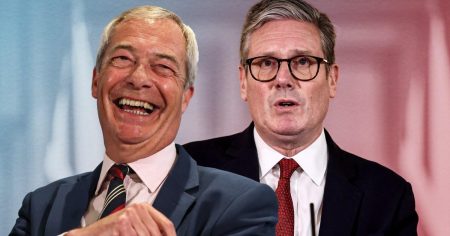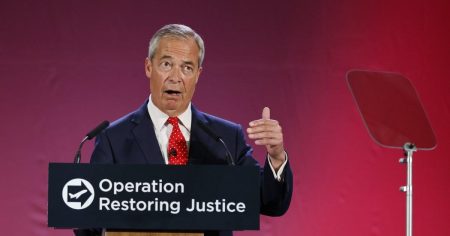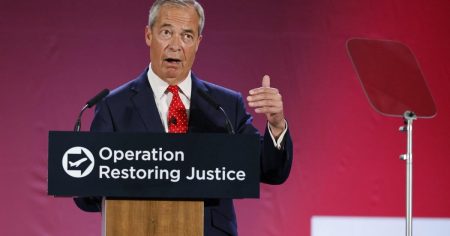Reform UK’s Membership Surge and the Shifting Political Landscape
Reform UK, the political party spearheaded by Nigel Farage, has recently announced a significant milestone, claiming to have surpassed the Conservative Party in membership numbers. This development marks a potentially seismic shift in the British political landscape, as Reform UK positions itself as a viable alternative to the established parties. The party’s own tracker indicates a membership exceeding 131,690, marginally surpassing the Conservatives’ reported figure of 131,680. This surge in membership comes in the wake of a general election where Reform UK secured five parliamentary seats and gained considerable ground in traditionally Conservative strongholds. The party’s ascendancy presents a formidable challenge to the newly elected Conservative leader, Kemi Badenoch, who assumed the mantle of leadership following a disastrous election outcome for the Tories. Badenoch now faces the daunting task of revitalizing her party’s base and countering the growing appeal of Reform UK.
Reform UK’s rapid growth has been attributed, in part, to the perceived failings of the Conservative government and a growing disillusionment among certain segments of the electorate. Nigel Farage, a seasoned politician known for his staunch views on immigration and Brexit, has effectively tapped into this sentiment, attracting voters dissatisfied with the status quo. The party’s messaging resonates with those who feel their concerns are not being addressed by the mainstream parties, further bolstering its membership ranks. This recent surge underscores the evolving dynamics of British politics and the potential for significant realignment in the near future.
Nigel Farage’s claims of attracting a younger demographic to the party, with over 1,000 young people reportedly joining in just two days, adds another layer of complexity to the situation. This influx of younger members suggests that Reform UK’s message is not confined to older generations and has the potential to reshape the party’s image and long-term trajectory. While the Labour Party still maintains a substantial lead in membership, with over 370,000 members, the rapid growth of Reform UK poses a direct threat to the Conservatives’ position as the primary opposition party. This competitive landscape could potentially lead to a more fragmented political arena, with smaller parties wielding greater influence.
The implications of Reform UK’s membership surge extend beyond mere numbers. It signals a growing appetite for alternative political narratives and a potential shift in voter allegiances. The Conservatives, under Kemi Badenoch’s leadership, must now grapple with the challenge of regaining lost ground and appealing to voters who have turned to Reform UK. The party’s ability to adapt to this evolving landscape and address the concerns of its base will be crucial in determining its future success. Meanwhile, Reform UK’s continued growth could potentially reshape the political landscape, leading to a more fragmented and competitive environment. This dynamic could lead to unexpected alliances and policy shifts as parties jostle for position and influence.
Adding to the complexity of the political landscape is the ongoing debate surrounding Nigel Farage’s public persona and the incidents that have garnered media attention. A recent case involving a milkshake being thrown at Farage during a campaign event resulted in the perpetrator receiving a suspended prison sentence. Farage’s reaction to the incident, characterizing it as an example of a "two-tier justice system," has further fueled discussions about freedom of speech, political protest, and the appropriate response to such acts. This incident, along with Farage’s controversial remarks on various issues, contributes to the polarizing nature of his public image, both attracting fervent supporters and drawing strong criticism.
As the political landscape continues to evolve, the implications of Reform UK’s rising membership remain to be seen. The party’s ability to translate this growth into electoral success and influence policy decisions will be a key factor in shaping the future of British politics. The Conservatives, facing a significant challenge from Reform UK, must adapt and respond strategically to retain their position within the political arena. The upcoming months and years will offer crucial insights into the long-term impact of Reform UK’s emergence and its influence on the broader political discourse. The interplay between established parties and emerging forces like Reform UK will undoubtedly shape the political landscape and determine the direction of the country in the coming years.











